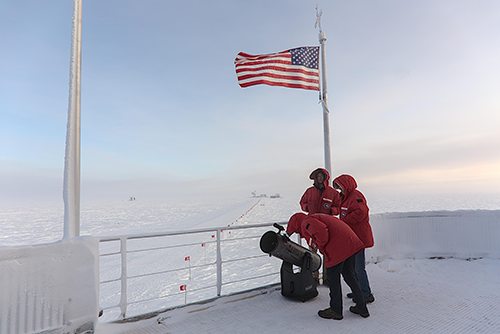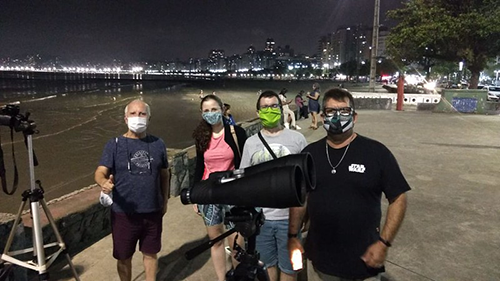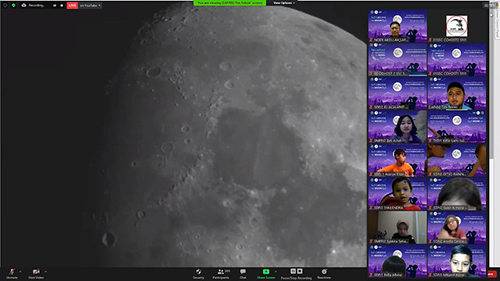A Worldwide Celebration: International Observe the Moon Night
- 1NASA's Goddard Space Flight Center, Greenbelt, MD, USA (staci.l.tiedeken@nasa.gov)
- 2ADNET Systems, Inc., Bethesda, MD, USA
- 3University of Maryland-College Park, College Park, MD, USA
- 4Planetary Science Institute, Tucson, AZ, USA
- 5Lunar and Planetary Institute, Houston, TX, USA
- 6The University of Edinburgh, Edinburgh, Scotland
- 7NASA's Ames Research Center, Mountain View, CA, USA
- 8Astronomical Society of the Pacific, San Francisco, CA, USA
Introduction: International Observe the Moon Night is a worldwide public engagement program that has been held annually since 2010. Every autumn, we ask people to observe the Moon in whatever way makes sense to them (via binoculars, telescopes, unaided eye, images, artwork, songs, stories, etc.). The event occurs when the Moon is in or near a first-quarter phase, which provides excellent viewing opportunities along the terminator (the line between night and day), as long shadows place lunar features into great relief.
Hundreds of thousands of individuals all around the globe participate in the event as a collective whole, learning about lunar science and exploration, taking part in celestial observations, and honoring cultural and personal connections to the Moon. People participate in a variety of ways, including hosting or attending virtual or in-person events and observing the Moon from home. Participants also have the opportunity to connect with other lunar observers around the world through our Facebook page (facebook.com/observethemoon/), our Flickr group for images (flickr.com/groups/observethemoon2021/), and through the hashtag #ObserveTheMoon across social media platforms.
Getting Involved: Everyone has the opportunity to be a part of this NASA program. It is incredibly easy to participate in International Observe the Moon Night – no high-tech or expensive equipment is required. Despite the challenges brought by the COVID-19 pandemic, International Observe the Moon Night 2020 still experienced strong successes, and we are now supporting virtual events more than ever before. We have also developed numerous digital resources to support hosts and individual observers alike, all of which can be found on our website, moon.nasa.gov/observe.

Figure 1: International Observe the Moon Night 2020 participants at the South Pole, Antarctica (a first for the program!). Image credit: Zach Tejral, https://flic.kr/p/2jMuyUX
Registration. There are multiple entryways into participating in International Observe the Moon Night. Our website contains a page dedicated to registration, where people are able to search for events that are already planned (both in-person and virtual), register their own events, or sign up as individual lunar observers. Events can be scheduled anytime in the two-week period surrounding the main International Observe the Moon Night date in order to better accommodate event hosts and participants.
Bringing Science to Local Communities. International Observe the Moon Night provides the opportunity to unite in learning about and observing the Moon and the wonders of lunar and planetary exploration. It is also a great way for scientists to share lunar science with their communities and to connect with community partners. Collaborating at the community level encourages a more diverse and inclusive environment for participants.

Figure 2: An International Observe the Moon Night 2020 event in Santos, Brazil. Image credit: Roberto Strauss (Astronomia na Rua Santos), https://flic.kr/p/2jLXqU8
The present time is an especially exciting one for lunar science and exploration. With the first Commercial Lunar Payload Services (CLPS) instruments planned for launch at the end of this year, International Observe the Moon Night offers a great opportunity to discuss these missions and the future of lunar exploration. NASA’s Artemis program also continues to move forward and will land the first woman and first person of color on the Moon within the coming years.
2021 Event: Join us for the next International Observe the Moon Night on Saturday, October 16, 2021.
NASA TV Broadcast. In 2020, circumstances of the pandemic directed us to incorporate more virtual event opportunities, resulting in our first NASA TV broadcast. In 2021, we will again produce this aspect of the program, providing people around the world the ability to celebrate the event with us across multiple NASA centers. The broadcast will likely feature science talks, hands-on activity demonstrations, and live Q&A via social media.

Figure 3: A virtual International Observe the Moon Night 2020 event in Indonesia. Image credit: School Science Center, Sekolah Pembangunan Jaya, https://flic.kr/p/2jPUr3d
Worldwide Moon Party. Join us on Saturday, October 9 to kick off the International Observe the Moon Night week of observing with a worldwide Moon party. There will be live streams of the Moon and lunar stories from cultures around the world, among other features. To participate and to learn more, please visit: https://bit.ly/moonkickoff.
International Observe the Moon Night is still growing, and we welcome new collaborators, participants, and ideas for engagement. Additional information about the event can be found at moon.nasa.gov/observe.
International Observe the Moon Night is sponsored by NASA’s Lunar Reconnaissance Orbiter (LRO) mission and the Solar System Exploration Division at NASA’s Goddard Space Flight Center, with many contributing partners.
How to cite: Tiedeken, S., Jones, A., Wasser, M., Barry, C., Whelley, N., Buxner, S., Bakerman, M., Joseph, E., Shaner, A., Fooshee, J., Day, B., Gay, P., and White, V.: A Worldwide Celebration: International Observe the Moon Night, European Planetary Science Congress 2021, online, 13–24 Sep 2021, EPSC2021-75, https://doi.org/10.5194/epsc2021-75, 2021.

